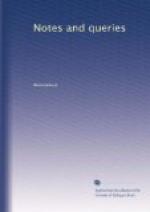Mr. Ross is right in saying that “no alteration has taken place in the practice of the House of Commons with respect to the admission of strangers.” The practice was at variance with the old sessional order: it is consistent with the new standing order of 1845. I do not understand how any one can read these words of the new standing order, “that the sergeant-at-arms ... do take into his custody any stranger whom he may see ... in any part of the house or gallery appropriated to the members of the House: and also any stranger who, having been admitted into any other part of the house or gallery,” &c., and say that the House of Commons does not now recognise the presence of strangers; nor can I understand how Mr. Ross can doubt that the old sessional order absolutely prohibited their presence. It did not keep them out certainly, for they were admitted in the teeth of it; but so long as that sessional order was in force, prohibition to strangers was the theory.
Mr. Ross refers to publication of speeches. Publication is still prohibited in theory. Mr. Ross perhaps is not aware that the prohibition of publication of speeches rests on a foundation independent of the old sessional order against the presence of strangers,—on a series of resolutions declaring publication to be a breach of the privileges of Parliament, to be found in the Journals of 1642, 1694, 1695, 1697, 1703, 1722, and 1724.
We unfortunately cannot settle in your columns whether, as Mr. Ross asserts, “if a member in debate should inadvertently allude to the possibility of his observations being heard by a stranger, the Speaker would immediately call him to order;” but my strong belief is, that he would not: and I hope, if there are any members of the House of Commons who have time to read “Notes and Queries,” that one of them may be induced to take a suitable opportunity of obtaining the Speaker’s judgment.
“Yet at other times,” Mr. Ross goes on to say, “the right honourable gentlemen will listen complacently to discussions arising out of the complaints of members that strangers will not publish to the world all that they hear pass in debate.” If this be so, I suppose the Speaker sees nothing disorderly in a complaint, that what has been spoken in Parliament has not been published: but I read frequently in my newspaper that the Speaker interrupts {125} members who speak of speeches having been published. “This is one of the inconsistencies,” Mr. Ross proceeds, “resulting from the determination of the House not expressly to recognise the presence of strangers.” Inconsistency there certainly is,—the inconsistency of making publication a breach of privilege, and allowing it to go on daily.
As strangers may be admitted into the House to hear debates, and not allowed to publish what they hear, so they may he admitted, subject to exclusion at certain times, or when the House chooses. And this is the case. The House, of course, retains the power of excluding them at any moment. They are always made to withdraw before the House goes to a division. This is a matter of practice, founded probably on some supposed reasons of convenience. Again, on any member desiring strangers to be excluded, the Speaker desires them to withdraw, without allowing any discussion.




